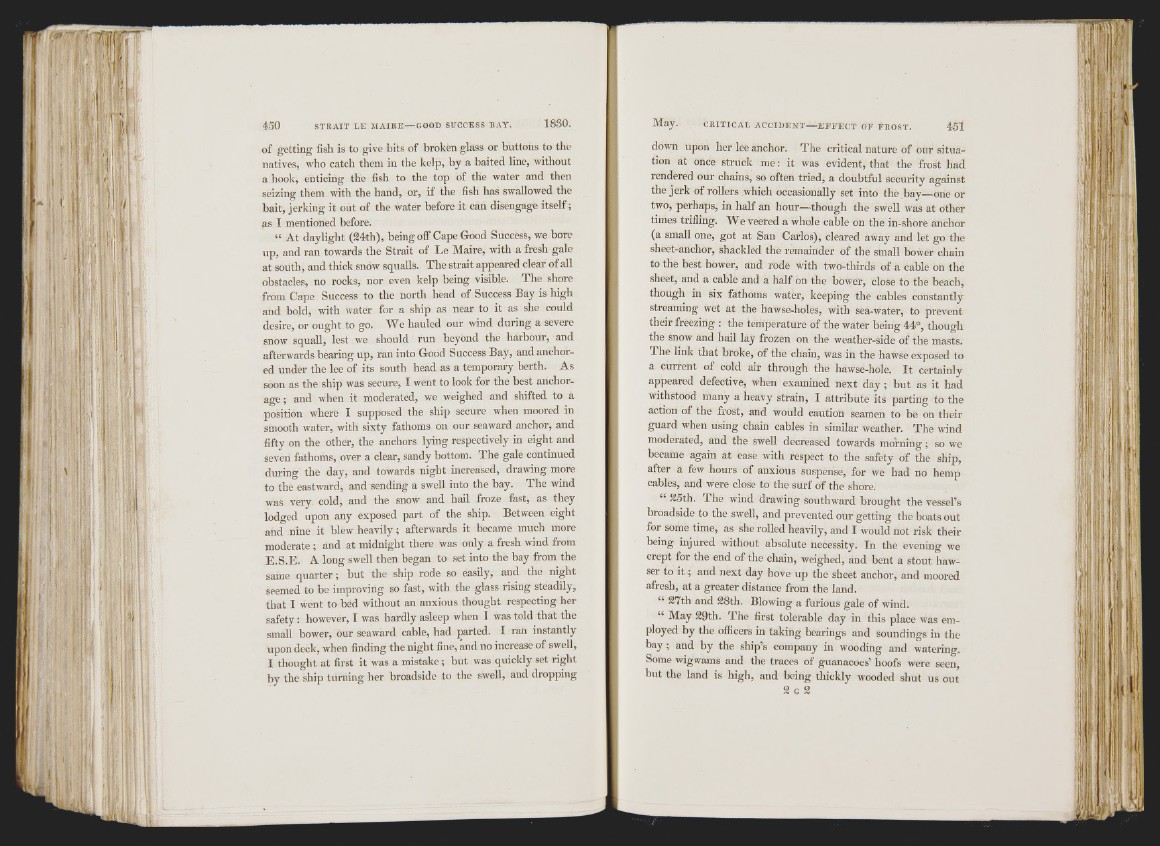
ft
ft
ft
■r
' ' f t r t
V
450 STRAIT LE MAIRE— GOOD SUCCESS BAY. 1830.
of getting fish is to give bits of broken glass or buttons to the
natives, who catch them in the kelp, by a baited line, without
a hook, enticing the fish to the top of the water and then
seizing them with the hand, or, if the fish has swallowed the
bait, jerking it out of the water before it can disengage itself;
as I mentioned before.
“ At daylight (24th), being off Cape Good Success, we bore
up, and ran towards the Strait of Le Maire, with a fresh gale
at south, and thick snow squaUs. The strait appeared clear of all
obstacles, no rocks, nor even kelp being visible. The shore
from Cape Success to the north head of Success Bay is high
and bold, with water for a ship as near to it as she could
desire, or ought to go. We hauled our wind during a severe
snow squaU, lest we should run beyond the harbour, and
afterwards hearing up, ran into Good Success Bay, and anchored
under the lee of its south head as a temporary berth. As
soon as the ship was secure, I went to look for the best anchorage
; and when it moderated, we weighed and shifted to a
position where I supposed the ship secure when moored in
smooth water, with sixty fathoms on our seaward anchor, and
fifty on the other, the anchors lying respectively in eight and
seven fathoms, over a clear, sandy bottom. The gale continued
during the day, and towards night increased, drawing more
to the eastward, and sending a swell into the bay. The wind
was very cold, and the snow and hail froze fast, as they
lodged upon any exposed part of the ship. Between eight
and nine it blew heavily; afterwards it became much more
moderate ; and at midnight there was only a fresh wind from
L.S.L. A long swell then began to set into the bay from the
same quarter; but the ship rode so easily, and the night
seemed to be improving so fast, with the glass rising steadily,
that I went to bed without an anxious thought respecting her
safety : however, I was hardly asleep when I was told that the
small bower, our seaward cable, had jiarted. I ran instantly
upon deck, when finding the night fine, imd no increase of swell,
I thought at first it was a mistake; but was quickly set right
by the ship turning her broadside to tlie swell, and dropping
May. c ritical ac c iden t EFFECT OF FROST. 451
down upon her lee anchor. The critical nature of our situation
at once struck me: it was evident, that the frost had
rendered our chains, so often tried, a doubtful security against
the jerk of rollers which occasionally set into the bay—one or
two, perhaps, in half an hour—though the swell was at other
times trifling. We veered a whole cable on the in-shore anchor
(a small one, got at San Carlos), cleared away and let go the
sheet-anchor, shackled the remainder of the small bower chain
to the best bower, and rode with two-thirds of a cable on the
sheet, and a cable and a half on the bower, close to the beach,
though in six fathoms water, keeping the cables constantly
streaming wet at the hawse-holes, with sea-water, to prevent
their freezing : the temperature of the water being 44°, though
the snow and hail lay frozen on the weather-side of the masts.
The link that broke, of the chain, was in the hawse exposed to
a current of cold air through the hawse-hole. It certainly
appeared defective, when examined next day; but as it had
withstood many a heavy strain, I attribute its parting to the
action of the frost, and would caution seamen to be on their
guard when using chain cables in similar weather. The wind
moderated, and the swell decreased towards morning; so we
became again at ease with respect to the safety of the ship,
after a few hours of anxious suspense, for we had no hemp
cables, and were close to the surf of the shore.
“ 25th. The wind drawing southward brought the vessel’s
broadside to the swell, and prevented our getting the boats out
for some time, as she rolled heavily, and I would not risk their
being injured without absolute necessity. In the evening we
crept for the end of the chain, weighed, and bent a stout hawser
to i t ; and next day hove up the sheet anchor, and moored
afresh, at a greater distance from the land.
“ 27th and 28th. Blowing a furious gale of wind.
“ May 29th. The first tolerable day in this place was eni-
ployed by the officers in taking bearings and soundings in the
bay; and by the ship’s company in wooding and watering.
Some wigwams and the traces of guanacoes’ hoofs were seen,
hut the land is high, and being thickly wooded shut us out
2 G 2
i f i
r v
ft»
il !''
f '
i'
( : ;